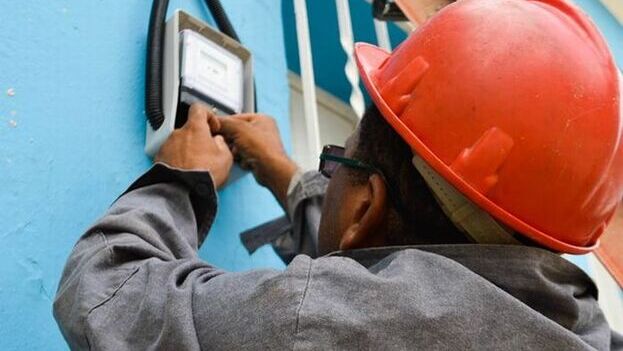
When customers decide to dispense with the fraudulent mechanism, the Electric Company employees retaliate
Por Natalia López Moya (14ymedio)
HAVANA TIMES – Camila, 52 years old, checks the number on the meter up to three times a day. She leaves her apartment in the Wajay neighborhood in Havana, reaches the common area where all the devices of the five-storey building and dozens of apartments are located and takes a photo of the number shown on the screen before returning home. Four weeks ago she dropped out from a mechanism to steal electricity in complicity with an employee of the Electric Union (EU).
“When you get out of this business they punish you,” she tells 14ymedio. “I had been paying “on the left” [the informal market] for two years to get a much lower reading, but I am no longer interested in continuing. Now they are going after electricity frauds, and I don’t want to get stuck in this.” Another reason not to continue with illegal payments in exchange for a receipt with lower wattage: “My two children have emigrated, and my husband and I no longer consume so much electricity.”
For more than three years, Camila was one of the many Cubans who, in collaboration with UNE workers, received an electricity bill well below the amount of energy she actually used. “It wasn’t so much to save money, because at the end of the day I was paying; it was so I wouldn’t be noted as a high consumer,” she says. “My husband has an official position, and it is not convenient for him to get a very high reading.”
Time passed, and the couple decided to drop out of the fraud, but they fear that the employee involved in the agreement will penalize them. “When you tell him that you don’t want to continue, the next few months a high reading will arrive. It is how they can make you return to the contract and throw you to the inspectors, who suddenly see a strange increase in consumption.”
Others, like Ismael, 34, entered the list of energy offenders without knowing it. “My mother and I moved from Central Havana to a larger house with a patio in the Cotorro,” he explains. “A few weeks ago some inspectors descended on us, and it turns out that there was a cable that didn’t go through the meter clock and that we were getting our electricity from it.”
Ismael says that it has nothing to do with the illegal installation of the cable. “It was left by the previous owners of the house; we didn’t even know that it existed.” But the fine came anyway. “The oversight cost me 8,000 Cuban pesos, and I did well, because in this neighborhood there are people who have had to pay more. Mine wasn’t so serious because I showed the papers for the permuta (house swap), and they saw that I had been in this house for a short time.”
Like Camila, every now and then Ismael checks his meter because he fears, this time, that some nearby neighbor will “create a bridge” and steal the electricity that he now pays for watt by watt. The crystal case, the numbers that fall as the energy passes to the house and the figure that he writes down with discipline in a notebook keep him attentive. But he warns that “in this area there are many who steal electricity by agreement with the UNE workers than those who do it on their own.”
This Friday, the official newspaper Granma revealed – citing the Minister of Energy and Mines Vicente de la O Levy – that 266,000 electrical crimes were detected in Cuba in 2023. “What is being stolen from the country by electrical fraud is almost as big as what is generated by the Antonio Guiteras thermal power plant, one of those with the largest generation capacity on the Island.”
The complaint came from an announcement that this Saturday there will be blackouts throughout the Island, especially in the “peak hours of night,” due to a deficit of 821 megawatts in the generation. The UNE reported that unit 5 of the thermoelectric plant of Mariel, the 1 of Santa Cruz, the 5 of Diez de octubre, the 1 and the 2 of the Felton and the 5 of the Renté were damaged, a series of key points in the electrical network throughout the country.
Determined to show the “human face” of the UNE official, the official press interviewed the technical director of the company, Lázaro Guerra, who offers a daily report on the situation in front of the cameras of the island’s information system. Graduated from the pre-university vocational Lenin school, from Havana, and with a degree in Electrical Engineering, Guerra was also a leader of the Union of Young Communists.
The official took advantage of the interview to exalt the “exceptional work” of the UNE and said that he had experienced situations of extreme difficulty as a manager. “The most tense moments in my career have come when the system has crashed. This has happened on some occasions due to the passage of cyclones and, in others, due to different causes.”
However, the most memorable line of the interview was his answer to the question of why he was “so serious” on Cuban Television: “I don’t think I can announce a blackout with a smile; I don’t think I can do it.”
Translated by Regina Anavy for Translating Cuba
Read more from Cuba here on Havana Times




